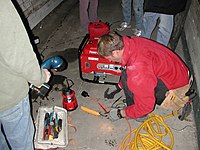Electrician

An electrician is a tradesman specializing in electrical wiring of buildings and related equipment. Electricians may be employed in the construction of new buildings or maintenance of existing electrical infrastructure.[1]
Terminology
In the U.S.A electricians are sometimes referred to as Inside Wireman as opposed to Outside Linemen who work on electric utility company distribution systems at higher voltages. "Electrician" is also used as the name of a role in stagecraft, where electricians are tasked primarily with hanging, focusing, and operating stage lighting. In this context, the Master Electrician is the show's chief electrician. Although theater electricians routinely perform electrical work on stage lighting instruments and equipment, they are not part of the electrical trade and have a different set of skills and qualifications from the electricians that work on building wiring.
Training and regulation of trade

In most countries, the job of an electrician is a regulated trade for safety reasons due to the many hazards of working with electricity, requiring testing, registration, or licensing. They are usually required to serve an apprenticeship lasting from 3 to 5 years under the general supervision of a Master Electrician and usually the direct supervision of a Journeyman Electrician. Schooling in electrical theory and electrical building codes is usually required to complete the apprenticeship program. A Journeyman electrician is a well rounded craftsman trained in all phases of electrical construction installation in various building styles and maintenance of equipment after installation. A Master Electrician must first be a Journeyman and usually has a minimum of two years more experience and has to pass further testing. A Master Electrician is further trained in layout, estimation, and design of electrical installations.
Licensing
Licensing of electricians is controlled through government and/or professional societies.
JIB (UK)
For electricians in the construction industry the JIB Electrotechnical Certification scheme provides certification and qualification for the Electrical Contracting Industry (ECA) for an annual fee.
JIB is in place to regulate and control Employment of electricians in the construction industry. It is responsible for skill levels, proficiency, wage levels and welfare benefits of its members.
United States
In the United States a permit is required for many types of construction work. Permits are regulated mainly on the local level of government, in order to obtain a permit for a certain type of electrical work it may be necessary to be a master electrician. The requirements for becoming a master electrician vary between states. There are often interstate agreements where different states accept certifications from each other.
Trade Oranizations
Many unions represent electricians such as the International Brotherhood of Electrical Workers; the International Union of Electronic, Electrical, Salaried, Machine, and Furniture Workers; International Association of Machinists and Aerospace Workers; United Auto Workers; and the United Steelworkers.[2]
See also
- Best boy
- Building code
- Circuit breaker
- Circuit breaker panel
- Domestic AC power plugs and sockets
- Electrician (theater)
- Electricity
- Electric light
- Electric switch
- Electrical wiring
- Fire safety
- Industrial & multiphase power plugs & sockets
- International Brotherhood of Electrical Workers
- Moritz Volz - an English footballer nicknamed "The Electrician"
- Lineman (occupation)
- National Electrical Code (US)
- Power cable
- Power cord
- Residual-current device
- Three-way circuit
- Wire
Tools of the trade
- Electrical tape
- Fish tape
- Friction tape
- Lineman's pliers
- Multimeter
- Needle-nose pliers
- Rotosplit
- Solenoid voltmeter
- Wire stripper
- Wireless Light Switch
References
- ^ Roger Jones (2004). Electrician. Trotman Publishing. ISBN 0856609978.
- ^ "Electricians". BLS. 2006-08-04. Retrieved 2007-06-30.
{{cite web}}: Cite has empty unknown parameter:|coauthors=(help)
